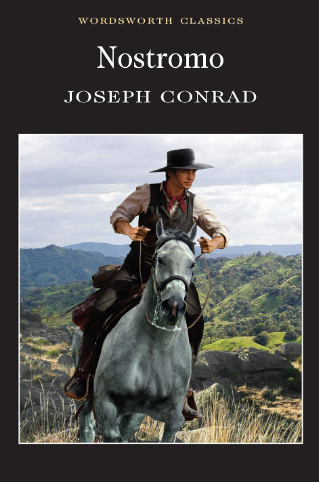Started: June 12, 2024 | Finished: June 15, 2024
Nostromo

Nostromo is a story set in early twentieth century Latin America in the fictional country of Costaguana and its port city of Sulaco. It is written from the perspective of a Westerner as opposed from the viewpoint of a native. What I'm getting at here is that Latin American stories of this type have a certain "flavor" or "feel". It feels colonial, gritty, squalid, temperamental, and wild; focusing on the terrible condition being brought about by the unhappy combination of a corrupt and exploitative local government and an uneducated citizenry.
When I read Nostromo it immediately brought to mind Graham Greene's The Power and the Glory.; both books have the same vibe. I am not a fan of this setting and with The Power and the Glory what kept me going was the talent of Graham Greene. The same with Nostromo, Conrad's writing chops kept me reading till the end in spite of the gloomy setting.
Conrad begins his story beautifully, with a breathtaking description of the coastal town of Sulaco and its environs, starting with the Placid Gulf adjacent to the town. Then Conrad proceeds to show how people can mess up paradise. Costaguena has just emerged from a dark age that was spent under a ruthless dictator. The government that has taken over is beset by a successful revolution that promises to bring yet another dark Age.
We are shown how this "darkness" slowly descends on the Occidental Province that Sulaco is a part of. Sulaco is the jewel in the crown of Costaguano because it has an extremely successful silver mine. Against all odds the mine was created and run by Charles Gould, a third generation Costaguaneran of English ancestry. The way Joseph Conrad narrates Gould's sheer cojones in establishing the mine is one of the highlights of the book
As the book progresses it begins to focus more and more on the different personalities in Sulaco. This immersion into the life fo Sulaco is so effective that when the threat of another dictator rising up and stealing the mine and despoiling Sulaco comes up I could really feel myself getting distressed. Conrad has managed to capture me into his tale.
The situation gets darker and darker and I'm on pins and needles about how it all would turn out when Conrad does something brilliant: He breaks his straight narrative and spends a chapter that is set in the future after all the excitement is over, and we get an after-the-fact narration rather than the usual style of telling the story as it unfolds. You must read this just to see how brilliant it is. For one thing, that chapter had the advantage of being able to tell large swathes of the tale with fewer words and it came at that perfect moment when I just wanted to know what happens.
You might be wondering at this point about who or what is "Nostromo". Nostromo is one of the inhabitants of Sulaco - a transplant from Italy named Giovanni Battista Fidanza; Nostromo is his nickname in Sulaco. If Conrad ever meant him to be the focus of the book I don't read him being that way. In fact I'm thoroughly unimpressed with Nostromo, who is written like some sort of superman. If the title should be the most impactful character in the book than this book should be titled Gould; should be, but I'm glad it isn't since Nostromo sounds better - although it made me expect a Russian rather than a South American tale.
Joseph Conrad is an amazing plot creator. I love how this book is structured. It does little back and forth jumps across the timeline of the story and these jumps keep the narrative interesting without confusing the reader. That said, Conrad's prose has been for me not that easy to read. I found myself, time and again, needing to reread passages. Several times I had to consult the dictionary because of Joseph Conrad's - to me - formidable vocabulary. But the extra labor from my end was more than worth it since I always had a sense that I was reading the work of a master storyteller. This is my first Joseph Conrad novel and I found it impressive and satisfying.